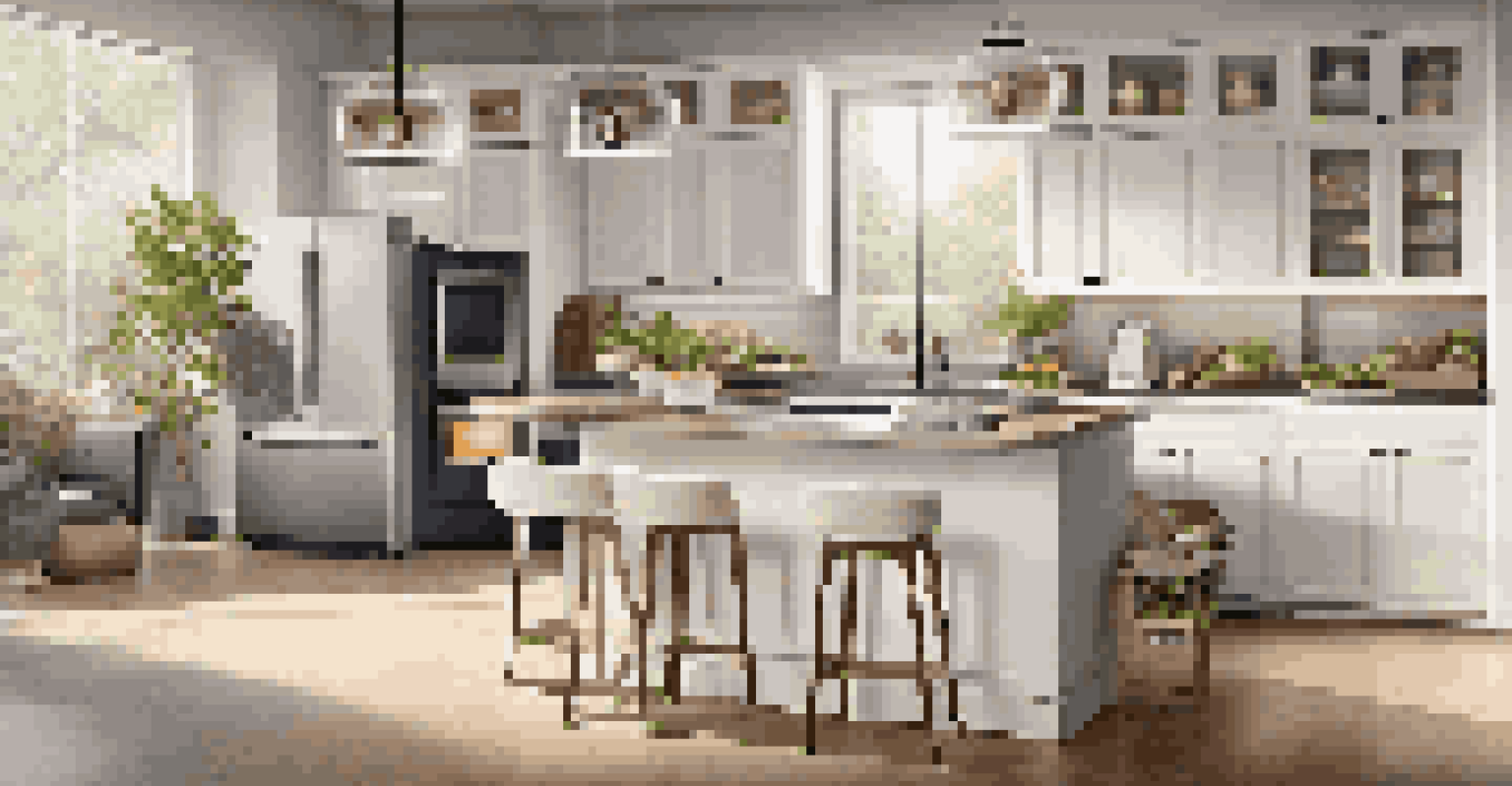The Impact of Smart Home Tech on Daily Life

What is Smart Home Technology and Why It Matters
Smart home technology refers to devices and systems that automate and enhance household tasks. This can range from smart speakers to advanced security systems. The convenience and control these technologies offer is transforming how we interact with our homes.
The future is already here – it's just not evenly distributed.
With the ability to control appliances and systems remotely via smartphones, smart home tech allows for greater efficiency and comfort. Imagine adjusting your thermostat or turning on the lights from anywhere, all with a simple tap. This level of convenience is not just a luxury; it's becoming a standard expectation.
Moreover, smart home technology fosters a sense of connection and security. With features like surveillance cameras and motion detectors, homeowners can monitor their properties in real-time. This peace of mind is invaluable, especially for those frequently away from home.
Convenience: A Day in the Life with Smart Tech
Imagine waking up to a home that knows your routine. Smart alarms can gradually brighten your bedroom lights, simulating a natural sunrise. This gentle wake-up call can start your day on the right foot, making mornings feel less rushed and more pleasant.

As you head to the kitchen, your smart coffee maker has already brewed your favorite blend, thanks to a scheduled setting. With smart home devices working harmoniously, you can save time and energy on daily tasks. This convenience is particularly beneficial for busy families juggling multiple schedules.
Smart Homes Enhance Daily Living
Smart home technology streamlines daily tasks, offering convenience and comfort through automation.
Even when you leave home, smart systems can handle the rest. Your smart locks can secure the doors automatically, and your thermostat can adjust temperatures for energy savings. It's like having a personal assistant, making your life easier every step of the way.
Energy Efficiency: Saving Time and Money
One of the most significant benefits of smart home technology is its potential for energy efficiency. Smart thermostats learn your heating and cooling preferences, adjusting settings to minimize energy consumption when you're not home. This not only saves money but also reduces your carbon footprint.
Technology is best when it brings people together.
Smart lighting systems are another game-changer. By using motion sensors and timers, these lights ensure that no energy is wasted. For example, they can automatically turn off when a room is empty, which is both eco-friendly and cost-effective.
In the long run, these energy-saving features can lead to substantial savings on utility bills. As awareness of sustainability grows, many homeowners are turning to smart tech as a step toward more responsible living. It's a win-win for both the environment and your wallet.
Enhanced Security: Keeping Your Home Safe
With smart home technology, home security has taken a significant leap forward. Smart cameras and doorbells allow homeowners to monitor their property in real time, providing peace of mind whether you're at home or away. You can check in anytime through your smartphone, making it easier to stay alert.
Additionally, smart locks offer advanced security options, such as keyless entry and remote locking features. Forgetting your keys is no longer a worry; you can grant access to friends or family through an app. This flexibility adds a layer of convenience without compromising security.
Energy Savings with Smart Tech
Devices like smart thermostats and lighting systems help reduce energy consumption, saving money and supporting sustainability.
Incorporating smart home tech also means you can set up alerts for unusual activities. For instance, if a door is opened unexpectedly, you receive a notification immediately. This proactive approach to home security helps deter potential threats and keeps your family safe.
Health and Wellness: A Smarter Way to Live
Smart home technology isn't just about convenience; it's also about enhancing your health and wellness. Devices like smart air purifiers can monitor air quality and filter out pollutants, creating a healthier living environment. This is especially important for families with allergies or respiratory issues.
Wearable tech can also integrate with smart home systems to track your health metrics. For example, smart scales can sync with your health apps, giving you a comprehensive view of your wellness journey. By encouraging healthier habits, smart technology supports overall well-being.
Moreover, some smart home features encourage physical activity. Smart speakers can play motivational workout playlists or prompt you to move throughout the day. This integration of technology into our daily routines promotes a healthier lifestyle.
Customization: Tailoring Your Smart Home Experience
One of the most appealing aspects of smart home technology is its customization options. From lighting colors to temperature preferences, homeowners can create an environment that suits their unique tastes and lifestyles. This personalization makes a house truly feel like home.
For instance, you can set different moods for various activities. Movie night? Dim the lights and adjust the temperature for ultimate coziness with a simple voice command. Hosting a party? Brighten the lights and crank up the music without lifting a finger.
Boosted Security for Peace of Mind
Smart security features, such as cameras and keyless entry, provide enhanced safety and allow homeowners to monitor their property remotely.
The ability to customize extends to routines as well. You can program your devices to perform certain actions at specific times, creating a seamless flow to your day. This level of control enhances the comfort and enjoyment of your living space.
Challenges and Considerations in Smart Home Integration
While smart home technology offers numerous benefits, it's essential to consider potential challenges. One primary concern is the complexity of integrating various devices and systems. With different brands and platforms, ensuring compatibility can sometimes be a hurdle.
Another challenge is security. As more devices connect to the internet, the risk of hacking increases. It's crucial to stay informed about best practices for securing your smart home, such as using strong passwords and regularly updating software.

Finally, the initial cost of setting up a smart home can be significant. However, it's worth noting that many devices offer long-term savings through energy efficiency. Weighing these factors can help you make informed decisions about your smart home journey.